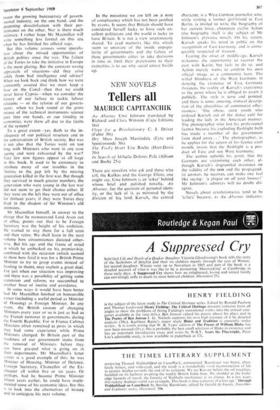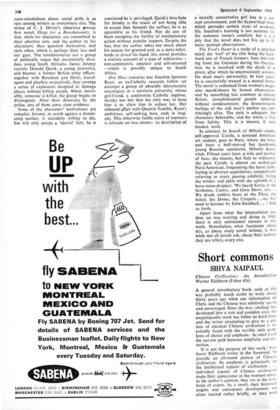NEW NOVELS
Tellers all
MAURICE CAPITANCHIK
An Absence Uwe Johnson translated by Richard and Clara Winston (Cape Editions 6s) Elegy for a Revolutionary C. J. Driver (Faber 30s) Dry Mass Joseph Martindale (Eyre and Spottiswoode 30s) The Fool's Heart Lise Roche (Hart-Davis 30s) In Search of Mihailo Dolores Pala (Allison and Busby 25s) There are novelists who ask and those who tell, the Kafkas and the George Eliots, one might say. Uwe Johnson is an 'asker' behind whose brief and polished novella, An Absence, lies the question of personal ident- ity, or the lack of it, as mirrored by the division of his land. Karsch, the central character, is a West German journalist who, while visiting a former girl-friend in East Berlin, is invited to write the biography of her current lover, champion cyclist Achim (the biography itself is the subject of Mr Johnson's previous novel). On his return. Karsch speaks his mind in public on the recognition of East Germany. and is conse- quently suspected of treason.
Fearing the onset of middle-age. Karsch welcomes the opportunity to recover the past with Karin, but fails to do so, and Achim merely wants to confirm his own official image as a communist hero. The wilful blindness of the West Germans in denying the existence of East Germany threatens the reality of Karsch's experience to the point where he is obliged to assert it publicly. The style is terse and pointed, and there is some amusing. ironical descrip- tion of the absurdities of communist offici- ousness: 'The obese, stern youth who ordered Karsch out of the dance cafe for leading the lady in the American manner. The photographer who lost his professional licence because his exploding flashlight bulb has made a member of the government faint dead away ...' The photographer. as he applies for the return of his licence each month, insists that the flashlight is a pro- duct of East and not West Germany.
The author upholds his point, that the Germans are victimising each other, al- though Karsch's disgruntled insistence on the validity of the DDR and the propagand- ist answers he receives, can make one feel like saying: 'a plague on all your houses!' Mr Johnson's admirers will no doubt dis- agree.
Novels about revolutionaries tend to be 'tellers' because, as An Absence indicates,
open-mindedness about social strife is as rare among writers as everywhere else. The virtue of C. J. Driver's otherwise prosaic first novel, Elegy for a Revolutionary, is that, while his characters are committed to their abortive acts, and the author to his characters, they question themselves and each other, which is perhaps their loss and our gain. The revolutionaries are a group of politically vague but passionately dissi- dent young South Africans. James Jeremy recruits Donald Quick, a young journalist, and Hunter, a former British army officer; together with Roseman and Devis, travel- agent and playboy respectively, they arrange a series of explosions designed to damage places without killing people. When, inevit- ably, someone is killed, the group begins to disintegrate. After their discovery by the police, one of them turns state evidence.
Some of the characters' motivations are complex. Jeremy, in revolt against a domin- ating mother, is suicidally willing to die, but will only accept a 'special' fate; he is convinced he is privileged. Quick's love-hate for Jeremy is the result of not being able to accept that, beneath the surface, he is as egocentric as his friend. Nor do any of them recognise the futility of revolutionary action without popular support. Despite the fact that the author takes too much about his society for granted and, as a story-teller, tends to reveal his hand, this novel provides a realistic account of a type of subversive— non-communist, amateur and self-oriented —which is possibly unique to South Africa.
Dry Mass concerns one Joachim Ignatius Ryan, an ex-Catholic research fellow set amongst a group of absurdly idiosyncratic sociologists in a northern university, whose girl-friend, a conformist Catholic ingenue, decides too late that the only way to keep him is to allow him to seduce her. Her rebound affair with Quentin Tumble, Ryan's ambitious, self-seeking boss, ends in trag- edy. This otherwise feeble satire of manners is relevant on two counts: its description of
a morally conservative girl lost in a cor- rupt environment, and the hypocritical sham which pervades certain areas of academic life. Joachim's learning is too accurate for the common room's comfort; but it is a pity that the novel does not live up to its more pointed observations.
The Fool's Heart is a study of a retarded mind, the 'fool' of the title being the back- ward son of French farmers. Sent into hid- ing from the Germans during the Occupa- tion, he is involved with the death of a priest, after which he unconsciously assumes the dead man's personality. In later years, he is successfully treated in a mental home. The novel is redeemed from women's maga- zine mawkishness by honest observation. and by something less common in current fiction, unsophisticated people rendered without condescension; the down-to-earth feelings of the sick man's mother are con- vincingly alive. The style is adequate, the characters believable, and the whole is free from falsity. This is a sincere, if very modest, work.
In contrast, In Search of Mihailo exudes self-approval. Carola, a cosseted American art student, goes to Paris, where she loves and loses a half-starved but handsome young Russian seminarist, Mihailo Kero- vitch. Fifteen years later, a wife and mother of four, she returns, but fails to rediscover the past. Carola is almost an archetypal Paris-American, frequenting the latest clubs, feeling in abstract superlatives, compulsively referring to every passing celebrity, listing the *niters and cafes with the aplomb of a born name-dropper: 'We heard Sartre at the Sorbonne, Camus, and Gary Davis, too ... We drank endless beers at the Fiore, the Select, the Dome, the Coupole ... we list- ened to lectures by John Steinbeck ...' And so forth.
Apart from what the international stu- dent set was wearing and doing in 1948, there is only sentimental interest in this work. Nonetheless, what fascinates about this, as about every novel written, is that while not all novels ask, about their authors they are tellers, every one.



































 Previous page
Previous page